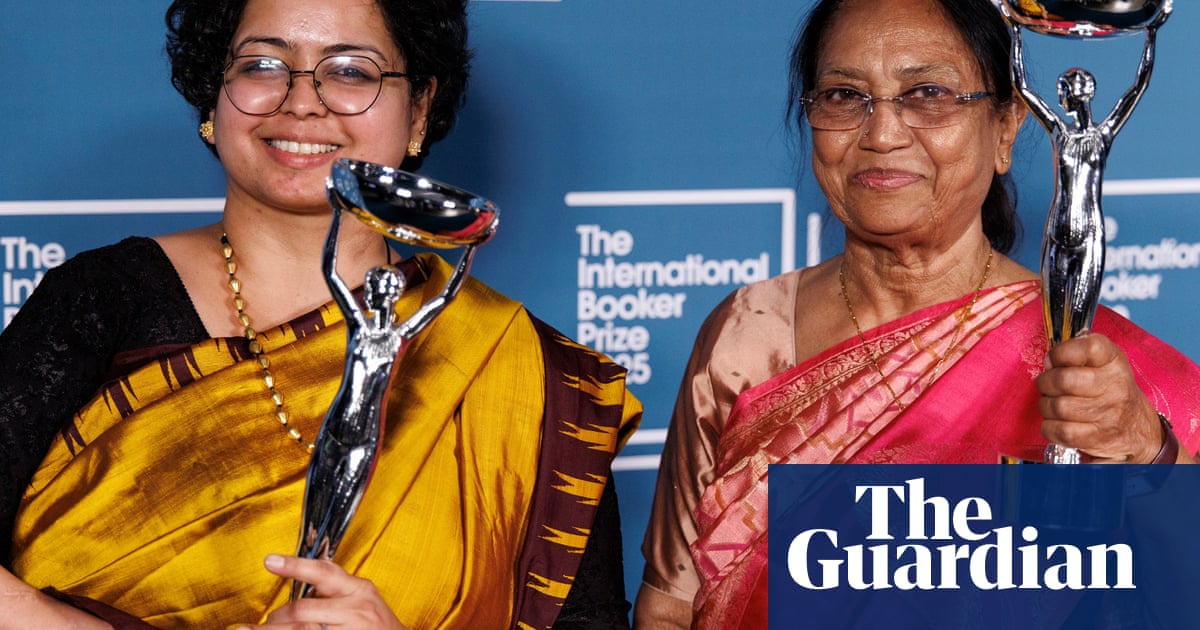‘Human beings and their basic nature are the same everywhere,” Banu Mushtaq says. “That is the intention of my writing. The theme is woman, the theme is marginalised people, the theme is to be a voice to the voiceless community.”
Mushtaq, from the Karnataka region of southern India, has been “awake all night”, she says, as we speak on the morning after she won the International Booker prize in London for her book Heart Lamp. The prize is shared between Mushtaq and her translator Deepa Bhasthi, who is also present – and also had no sleep.
It’s a year of firsts for the International Booker: this is the first time that a collection of stories has won; it’s the first winner from the Kannada language; and it’s Mushtaq’s first book to appear in English. At 77, she is also the oldest winner.
Yet Mushtaq, a lawyer and social activist as well as a writer, has been publishing stories since 1981; Heart Lamp represents just a selection from her career. They are powerful accounts of the lives of Muslim women in Karnataka, portraying terrible experiences – domestic violence, deaths of children. In the final story, a woman is glad she gave birth to a boy instead of another girl. “At least we had not created another helpless prisoner of life like me.”
Do these stories reflect how things still are for women in the region? “Yes,” says Mushtaq. “Even today. It starts from the home itself.”
But the stories have wider application too. For example, any parent can empathise with the woman in one story, Red Lungi, struggling to entertain her children during the summer holidays. “Even though these stories are set in a certain community in a certain geographical location,” says Bhasthi, who was born and still lives in Madikeri in the Western Ghat mountains, just 60 miles or so from Mushtaq’s home town. “I think the ideas and stories are absolutely universal.”
How does Mushtaq’s work as a lawyer and activist inform her writing? “They are the fields where I sow the seeds of my stories. When people come to me with a legal issue, they want to share all their feelings […] which haunt me like anything. It goes on growing and then one day, I craft it into a short story.”
Can stories change things, the way a legal case can? “Of course, because people will not know what rights they have got, and how silent suffering is not the solution. They can fight back. That insight is given through my stories.” In the story Black Cobras, a woman is informed that Islam does allow women to be educated and to work, but the scriptures are “twisted” by scholars for their own benefit. “Do not beg,” she is told. “Demand justice.”
Amid the darkness of Mushtaq’s stories there is comedy too: in A Decision of the Heart, a man seeks a new husband for his widowed mother; but one of her suitors, a “dandy” with “the womanising disease”, is chased out of town covered in shit from a septic tank. Jokes, Mushtaq explains, enable her to be honest without causing offence.
after newsletter promotion
“I use that style of writing because I am telling the truth in the face of a power structure,” she says. “The power structure is patriarchy, politics, religion, all together. If I do it in a very serious tone, I will be liable for whatever consequences there are. So I give it a sarcastic turn. I intentionally use that strategy instead of undergoing self-censorship.” Bhasthi adds that in this story, “The underlying theme is that women are being controlled by men, even when it comes across as a joke.”
Mushtaq writes in the tradition of Bandaya Sahitya (literally “protest literature”), a “brief but highly influential movement”, as Bhasthi puts it, which arose in the 1970s against a literary landscape that was “mostly male, mostly upper caste”. The movement, whose slogan was, “If you are a writer, you are also a fighter”, “encouraged women and minority writers to write in their own registers” and, adds Mushtaq, “opened a gateway to all the downtrodden, marginalised and ignored people who didn’t have a voice”.
And although Mushtaq’s work has always been popular in India – “my literature is people’s literature”, she says – her openness sometimes gets her in trouble: those “consequences” she spoke of earlier. In 2000, she was subject to a fatwa – an Islamic legal decree – after saying that “Islam had never prohibited women from entering mosques and praying there” but rather that the patriarchs in certain mosques were “denying it unlawfully”.
So, she tells me, “some mosque authorities got offended and laid a fatwa against me, saying you are not among Muslims, you cannot socialise with Muslim people”. They lifted the fatwa “after three months, but during that time I suffered a lot due to it. But nowadays,” she adds, “they are allowing women to pray inside the mosque”.
Things are improving for women and minorities in India in some ways, Mushtaq says. “They’re progressing in higher education. But even then there are issues due to the patriarchy. If a girl of one community wants to marry a boy of another community, there will be issues.”
Bhasthi agrees. “It’s better than yesterday,” she concludes, “but there is still a very, very long way to go.”
